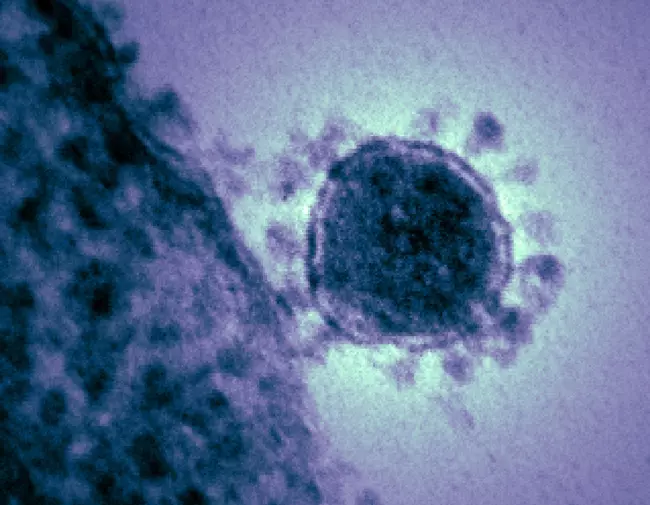Coronavirus - What you should know about it?
We can hear about the coronavirus more and more often, or the coronaviruses of the Coronavirinare subfamily, which are responsible to lead to have such as critical and dangerous health condition and development of infectious diseases like SARS or MERS, which are leading to serious acute respiratory disease, pneunomia or in case of people with weakened immune systems to death. But what do we know about these viruses, and how can we effectively protect ourselves?
A colorized transmission electron micrograph of the Middle East respiratory syndrome-related coronavirus (MERS-CoV) that emerged in 2012. (Source: By National Institute of Allergy and Infectious Diseases (NIAID), National Institutes of Health (NIH) - National Institutes of Health (NIH), Public Domain, https://commons.wikimedia.org/w/index.php?curid=29542524)
First of all, it is important to state that we are talking about viruses, ergo we are not able to cure the coronavirus disease with antibiotics, so in this way we can only medicate the symptoms, and the immune system of the human body can solve the final solutions of the healing. Fortunately, if you are full of healthy, your body can effectively fights against the virus disease. People who are suffering from chronic disease are in the greatest danger, mostly the older age group with weakened immune system. In their case severe respiratory consequences may develop due to the disease, which can lead to shortness of breath or finally death before their body's defense system could overcome the virus. So the people who are involved must be really careful in case of epidemic.
Although the disease can have serious consequences, at the same time the 20 percent of infections don't have any symptoms. In many cases we don't even realize that the person has become a virus carrier. This is not a lucky thing, because this variation makes the spreading more unpredictable. In this way, a healthy looking person, to whom the virus doesn't cause any problems, can pass the pathogen on to fellow people.
In fact, fortunately, the coronaviruses don't cause any diseases in case of toddlers, so most likely our children, grandchildren aren't in danger. At least based on our experience so far, and this is a good news for every parents and grandparents.
We can follow the current coronavirus epidemic in 2020, which started out from the city of Wuhan in China, in an infectological map. We can see exactly how can the diseases of the virus unexpectedly appear in the whole world: the spreading of the coronavirus of Vuhan (2019-nCoV)
About coronaviruses
Coronaviruses belong to the IV. class of the Baltimor's classification system, their heredity is positive (so it is able to use directly for mRNS), single-thread RNS ((+)ssRNA), their genoms are consisting of 26.000-32.000 basises, so in this way they are the greatest known RNS-viruses. They have lipid envelopes and their capsid is helical. The virion is spherical and its diameter is 120 nm long, but its size can be the double of this data. Their name comes from the protein spikes, which are embedded in their tegument. The lines of these protein spikes are outlined such as the corona of the Sun.
We can find the coronaviruses mostly in birds and mammal species, and they attack the cells of the upper respiratory organs and intestines of the infected individual. Six species of coronaviruses are dangerous for humans, and the most dangerous among them is the SARS-CoV that causes the SARS disease, which spread from a murine to humans at the start of the epidemic of 2003.
How can we prevent the infection of coronavirus?
- Wash the hands extensively with soap and warm water or use alcoholic hand disinfectant.
- Keep away the hands and fingers from the eyes, nose and mouth.
- Avoid the crowd and the direct contact with the infected individuals, or person who are looking sick.
- Follow the sneeze etiquette.
The most effective defense tactic against the coronaviruses is to pay attention to personal hygiene. This rule is based on regular and extensively hand washing with soap and warm water and the wearing of face mask in the areas affected by epidemics. Both of the precautionary measures are intended to prevent viruses to reach our mucous membranes by our hands (or directly our face) and through them get in to our body, when we use the public transport or just we are in direct contact whit other people. The reason of this is that people often unawares touch their own face and in case of this situation they bring the virus to their nose or mouth where whit the intercession of the mucous membranes it can easily get in the body.
As it is clear we can easily evade the infection with a little care, and with this action we can save not only ourselves but other people too, because this way without any symptoms we don't become a virus carrier and don't infect other people who may have weaker immune system than us with the pathogene. If we are properly careful and take precaution against the infection, we can avoid major epidemics, and also the possible death of others.
In case we still get infected the following symptoms may occur:
- Runny nose, sore throat, high fever, dry cough, chest pain, breathing difficulties, fatigue. (The coronavirus can only be clearly detected by laboratory tests)
In case we feel sick:
- Contact your GP or medical service on call by phone.
- Rest a lot.
- Drink a lot of liquid.
- Do the same as for a common cold - don't have direct contact with people and depending on our symptoms, try to alleviate them.
- In case the symptoms get worse, call for help right away!
Donát Novák
February 2020
